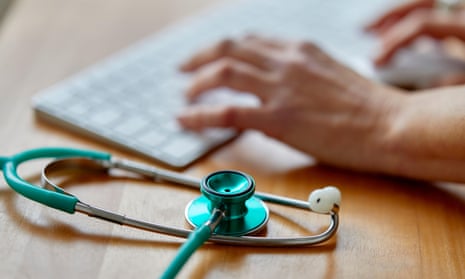I delight in messages from UK Biobank, making me feel useful for minimal effort. Back in 2006, with half a million others aged between 40 and 69, I signed up to this magnificent project, the world’s most advanced genetic database.
They took blood, saliva and urine, measured bone density and made notes on exercise, alcohol and family history, with social class, ethnicity, education, employment and income included. They have sequenced my genome and stored samples in freezers at -80C for future researchers seeking causes and cures long after my death.
We volunteers signed to allow our pseudonymised NHS data to be used for all time by researchers whose bona fides are strictly checked by gatekeepers of this unique treasure trove. It’s not for sale, it’s not for trivial or suspect use, but for the good of humankind. I glow with (slightly smug) pleasure whenever I am contacted by them.
But not this time, not this alarming email. Headlined “We are asking your GP for help”, it explains that they get automatic updates from the NHS if participants have hospital treatments, get cancer or die. But, “until now we have been unable to routinely receive important updates of health information held by the majority of GP practices – this is despite you giving us your permission when you first joined UK Biobank”.
I’m astonished. I assumed UK Biobank had automatic access to my records, but that appears not to be the case. UK Biobank says it needs our GPs’ “health data such as diagnoses, referrals, prescriptions, lab test results and symptoms – and no written notes – to be transferred securely”. Even though it is de-identified, and should present no privacy issues, this vital data languishes in GP computers, “a catastrophic loss of information on conditions such as dementia, Parkinson’s, depression or diabetes treated by GPs”, says UK Biobank’s chief scientist, Prof Naomi Allen.
Recently, a letter signed by UK Biobank, the Royal College of GPs and NHS England asked GPs to share this data. “We recognise GPs are extremely busy,” says the letter, but this very small task takes less than one minute to click one button, once, to hand over records of anyone registered with UK Biobank. It isn’t happening: only one in five UK Biobank volunteers have their GP information collected, despite our wishes.
GPs are mainly independent private practitioners – Aneurin Bevan’s one much regretted failure when setting up the NHS. (Wes Streeting intends to entice them to become NHS salaried, voluntarily.) It seems GPs can’t be ordered: legally they are data controllers, though Welsh and Scottish law allows use of their records. In a trial testing their willingness to share data, UK Biobank persuaded only 20% of English GPs to press the magic button. The other 80% ignored it, had never heard of UK Biobank, were not influenced by a fee, or were worried about liability for breaching data privacy, although the information commissioner declares it legal because we have consented.
Briefly during the pandemic, an emergency act ordered GPs to hand over Covid information, vital to track the disease, identify vulnerable people and test treatments such as dexamethasone, which saved up to 1 million lives worldwide. But that temporary order lapsed, the data is no longer available to seek long Covid cures: it’s time to restore it.
The British Medical Association refused to sign the UK Biobank letter sent to GPs, saying the relevant BMA IT committee was not consulted. It’s not a yes and not a no, but a “not yet”. It informs me the concern is that we who signed up in 2006 could have changed our minds, but that’s equally true of a will, a lasting power of attorney or other signatures given years ago.
Anxiety about abuse of NHS data may not be helped by news that the frontrunner for the £480m contract for an NHS federated data platform (FDP) is Palantir, originating in US defence, linked to US spying, whose owner, Peter Thiel, finances anti-abortion candidates and previously Donald Trump, while saying of the NHS that it would be ideal to “rip the whole thing from the ground and start over”. NHS England swears the contract only provides software without access to data, which stays within the NHS, but public mistrust dogged previous attempts when Tories foolishly suggested data might be privatised and sold. What’s not in doubt is that the NHS urgently needs this FDP to link fragmented systems, as advocated by a letter signed by a string of doctors today.
It means no more repeating your history at every NHS appointment: the tiny risk of misuse of records needs balancing with the immense value to treatment. Success depends on public trust, yet the very name Palantir strikes fear – and trust in this corrupted government is at absolute zero.
How tragic if the simple matter of GPs giving UK Biobank our information gets caught up in the issue of awarding a totally separate contract to that operator. To dispel needless fears, the admirable campaign UseMYdata, founded by cancer patients, urges people to give their information for research, while scrutinising privacy safeguards. Britain’s strong biosciences sector relies on NHS data, other countries lack our unified system, but post-Brexit and flight of the EU medicines agency, life sciences are losing key clinical trials as companies relocate. We need public trust in research.
I contacted my (excellent) GP practice to ask them to hand my data to UK Biobank. An administrator replied saying they never received the letter asking for it – maybe overworked, exhausted practices are swamped with requests. Whatever the reason for this non-communication, it would help if the BMA joined in the plea to GPs to hand over our data to spur on UK Biobank – and worldwide research.
Polly Toynbee is a Guardian columnist

